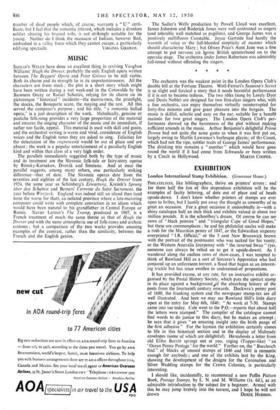MUSIC
SADLER'S WELLS have done an excellent thing in reviving Vaughan Williams' Hugh the Drover, probably the only English opera written between The Beggars' Opera and Peter Grimes to be still viable. Both its charm and its strength lie in its unpretentiousness. All the characters are from stock ; the plot is a short story which might have been written during a wet week-end in the Cotswolds by the Baroness Orczy or Rafael Sabatini, relying for its charm on its picturesque " historical " incidents—the morris-men, the prizefight, the stocks, the Bonaparte scare, the maying and the rest. All this served the composer's purpose ; and his title, " a romantic ballad opera," is a just description of the work. Melodically, genuine or pastiche folk-song provides a very large proportion of the material and ensures the singing character of the music and its immediate, if rather too facile, appeal. This material is used with skill and gusto, and the orchestral writing is warm and vivid, considerate of English voices and the English tunes they are asked to sing. Felicities for the delectation of the cognoscenti would be out of place and are absent ; the work is a popular entertainment of a peculiarly English kind and within that class of a very high order.
The parallels immediately suggested both by the type of music and its treatment are the Slavonic folk-tale or fairy-story operas by Rimsky-Korsakov, Dvorak and Smetana. And at once the parallel suggests, among many others, one particularly striking difference—that of date. The Slavonic operas date from the seventies and eighties of the last century, Hugh the Drover from 1924, the same year as Schonberg's Erwartung, Krenek's Sprung fiber den Schatten and Berners' Carrosse du Saint Sacrement, the year before Wozzeck. England was indeed still an island then (and none the worse for that), an isolated province where a late-maturing composer could write with complete conviction in an idiom which would have been natural to his grandfather in Central Europe or Russia. Xavier Leroux's The Tramp, produced in 1907, is a French treatment of much the same theme as that of Hugh the Drover and with the same atmospheric use of folk-tunes and archaic customs ; but a comparison of the two works provides amusing examples of the contrast, rather than the similarity, between the French and the English genius. The Sadler's Wells production by Powell Lloyd was excellent. James Johnston and Roderick Jones were well contrasted as singers (and tolerably well matched as pugilists), and George James was a positively mellifluous Constable. Joyce Gartside had hardly the warmth of voice or the full-blooded simplicity of manner which should characterise Mary ; but Olwen Price's Aunt Jane was a fine attempt to put nervous yet keroic British spinsterhood on to the operatic stage. The orchestra under James Robertson was admirably full-toned without offending the singers.
The orchestra was the weakest point in the London Opera Club's double bill at the Fortune Theatre. Wolf-Ferrari's Susanna's Secret is so slight and farcical a story that it needs beautiful performance if it is not to become tedious. The two roles (sung by Lorely Dyer and Denis Noble) are designed for two first-class singers who, with a fine orchestra, can enjoy themselves virtually uninterrupted for forty-five minutes and give great pleasure into the bargain. The music is skilful, eclectic and easy on the ear, suitable for a benefit matinee for two great singers. The London Opera Club's per- formance showed up the barrenness of the plot without making sufficient amends in the music. Arthur Benjamin's delightful Prima Donna had not quite the same gusto as when it was first put on, largely owing to Martin Lawrence's burlesque playin:: of the Count, which had not the ripe, subtler traits of George James' performance. The drinking trio remains a " number " which would have gone round the world if it had come from Schwanda or been written






































 Previous page
Previous page